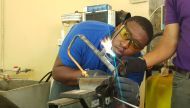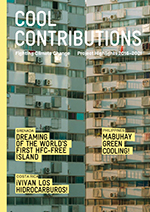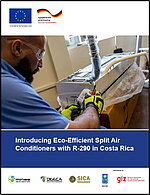Picking up on sustainable room ACs

Experts discuss ways to unlock the uptake of climate-friendly air conditioners in the European market.
On 17 October 2018, the German Federal Ministry for the Environment, Nature Conservation and Nuclear Safety (BMU), the German Federal Environment Agency (UBA) and the IKI project “Cool Contributions fighting Climate Change (C4)” jointly hosted an expert day on the sidelines of the international cooling fair Chillventa to bring together split-AC-related policy and industry to discuss what is required to unlock the market uptake of R290 split air conditioners (ACs).
Around 40 experts attended the event to listen to a series of speakers from the public and private sectors laying the groundwork for discussing opportunities and challenges facing R290 split AC technology in Europe. Within a supporting legislative framework, action needs to be taken by actors on the supply and demand side to steer the different market forces towards this green technology. The expert day centred on policy and technical- and capacity-related aspects to enable the European market uptake of R290 split ACs.
Split air conditioners are responsible for the largest share of GHG emissions resulting from refrigeration and air conditioning in many countries. Urbanisation, rising ambient temperatures and growing middle classes are drivers for the increasing sales of this market-dominating space-cooling appliance. The split AC market is also growing rapidly in Europe.
Global room AC markets are still dominated by air conditioners that often have only low to moderate energy efficiency levels. Another alarming shortcoming are the highly climate-damaging HCFC-22 and HFC-410a and HFC-32 refrigerants that transfer heat from indoors to outdoors in most of these appliances worldwide. Improper handling during manufacturing, installation and especially servicing let these substances leak into the atmosphere and thereby have an effect on global warming that is up to more than 600 times as great as the alternative natural refrigerant solution HC-290 (propane). Although sales of climate-friendly HC-290-based split ACs with top efficiency levels amount to more than 600,000 units in the Indian market, the European market has not picked up this sustainable solution yet.
At the expert day, BMU highlighted the need for low global warming potential (GWP) (below 10) refrigerants such as R290 for AC appliances, as the phasing out of hydrofluorocarbons (HFC) in compliance with the European F-gas regulation is already causing HFC refrigerant prices to rise. In addition, the GIZ Proklima project shared experiences of introducing climate-friendly split ACs as well as the required AC technician training and certification programmes in GIZ’s project partner countries, including examples from India, the Philippines and Grenada.

UBA presented the German eco label Blue Angel and the steps involved in getting a R290 split AC certified. The criteria include having a minimum Seasonal Energy Efficiency Ratio (SEER) of seven and using an F-gas free refrigerant. The Chinese manufacturer Midea, which received the first Blue Angel certification for split ACs for its inverter R290 model, highlighted its research and development work with regard to R290 and its plans to expand the R290 product portfolio.
The global market accelerator for natural refrigerants, Shecco, emphasised the increasing opportunities for introducing R290 split ACs globally, and in particular in the European market, in order to meet the growing demand in space cooling.

On behalf of the Federal Guild of German Refrigeration Plant Assemblers (BIV), the engineering firm DMT talked about its practical experiences of installing and servicing a R290 split AC demo unit. It was concluded that the installation and servicing of R290 can be handled without any difficulties or critical consequences, as long as safety aspects and the need for caution when handling R290 flammable gases are highlighted in the installation and servicing manual. Furthermore, AC technicians must be trained on the safe handling of flammable refrigerants in ACs.
As a follow-up to this event, Midea handed over a R290 split AC to one of the leading cooling training institutes in Germany, the BFS in Maintal, to train AC technicians on this appliance. According to Midea, broader market introduction is scheduled for May 2019.
The link has been copied to the clipboard
Contact
IKI Office
Zukunft – Umwelt – Gesellschaft (ZUG) gGmbH
Stresemannstraße 69-71
10963 Berlin












